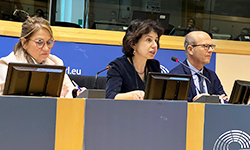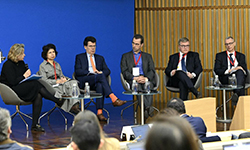BusinessEurope Headlines No. 2023-11
Negotiations with Australia on trade agreement must be wrapped up before summer

“We want to ensure the EU remains an open and competitive economy, while undergoing the transformation to net zero”, said BusinessEurope Director General Markus J. Beyrer at an online business roundtable organised by the Europe-Australia Business Council on 30 March. This is why, he added, BusinessEurope is glad to see that trade is one of the four pillars of the Green Deal Industrial Plan. The EU has recognised the need for open and fair trade to ensure more export opportunities and more access to the inputs needed for industry. “The focus should be on ensuring a better use of existing trade agreements, ratifying concluded agreements and concluding negotiations with Australia before the summer break”, Beyrer concluded.
Contact: Eleonora Catella
How to regain competitiveness and maximise sustainability
 “As European companies continue to do their utmost to upgrade their production processes to become ever more sustainable, strong carbon leakage measures are key”, said Luisa Santos, Deputy Director General at BusinessEurope, at an event organised by AEGIS Europe at the European Parliament on 28 March. The Carbon Border Adjustment Mechanism (CBAM) has been presented as the EU’s landmark tool to fight carbon leakage and encourage cleaner industrial production in non-EU countries. While CBAM could initially be a tool to fight carbon leakage, there are a number of issues that would need to be solved, such as export measures and tackling circumvention. “Therefore, the implementation phase will be crucial”, Santos highlighted.
“As European companies continue to do their utmost to upgrade their production processes to become ever more sustainable, strong carbon leakage measures are key”, said Luisa Santos, Deputy Director General at BusinessEurope, at an event organised by AEGIS Europe at the European Parliament on 28 March. The Carbon Border Adjustment Mechanism (CBAM) has been presented as the EU’s landmark tool to fight carbon leakage and encourage cleaner industrial production in non-EU countries. While CBAM could initially be a tool to fight carbon leakage, there are a number of issues that would need to be solved, such as export measures and tackling circumvention. “Therefore, the implementation phase will be crucial”, Santos highlighted.
Participants also discussed possible instruments to regain European competitiveness, for instance, trade defence tools and integrating procurement markets across the EU, since European producers have been hit by the energy crisis, the current geopolitical situation, and new macroeconomic conditions. They concluded that the EU’s open strategic autonomy, alongside a strong EU trade agenda, will be essential. “Now that CBAM is a reality, we should focus on mitigating its possible shortcomings”, Santos said. Part of the answer will be a fully World Trade Organisation (WTO) compliant measure to support exports by CBAM sectors, tackling potential circumvention practices carefully, as well as ensuring a dialogue with our trade partners to avoid challenges at the WTO and retaliation.
Contact: Elena Suárez
Patent law harmonisation would benefit users of global patent system
 Representatives of European patent users and the European Patent Office and its contracting states discussed the harmonisation of substantive patent law during the first session of a symposium on 23 March. The discussion covered key elements such as grace period, prior users rights and conflicting applications. Users are now invited to further discuss internally and try to reach consensus. The results of these additional talks will be presented at the second session later in May. Elena Bertolotto, Senior Adviser at BusinessEurope, stated that “industry has been one of the frontrunners of this project. We are confident that a more harmonised patent system would be beneficial for users of the global patent system”.
Representatives of European patent users and the European Patent Office and its contracting states discussed the harmonisation of substantive patent law during the first session of a symposium on 23 March. The discussion covered key elements such as grace period, prior users rights and conflicting applications. Users are now invited to further discuss internally and try to reach consensus. The results of these additional talks will be presented at the second session later in May. Elena Bertolotto, Senior Adviser at BusinessEurope, stated that “industry has been one of the frontrunners of this project. We are confident that a more harmonised patent system would be beneficial for users of the global patent system”.
Contact: Elena Bertolotto
AI risks at the workplace: nuanced approach needed to avoid red tape
 The European Union is lagging behind other advanced economies globally in terms of investment in artificial intelligence (AI). The EU is in the process of regulating AI, which can be helpful to provide a suitable EU level playing field. This is as long as EU policy-makers refrain from imposing on companies regulatory costs that put them at a disadvantage in terms of global competitiveness. We also understand the need to assess attentively the particular issues related to using AI solutions in the employment context. But rather than considering all uses of AI at the workplace as high risk, a more nuanced approach is needed to address a diverse reality of risks in a way that avoids placing unjustified red tape on employers. The European social partners have dealt with these issues in their 2020 autonomous framework agreement on digitalisation, which provides a good basis for national cross-industry social partners to address them in line with diverse national law and practice. These were the main messages conveyed by BusinessEurope Social Affairs Director Maxime Cerutti at the annual conference of the World Employment Confederation organised in Brussels on 29 March.
The European Union is lagging behind other advanced economies globally in terms of investment in artificial intelligence (AI). The EU is in the process of regulating AI, which can be helpful to provide a suitable EU level playing field. This is as long as EU policy-makers refrain from imposing on companies regulatory costs that put them at a disadvantage in terms of global competitiveness. We also understand the need to assess attentively the particular issues related to using AI solutions in the employment context. But rather than considering all uses of AI at the workplace as high risk, a more nuanced approach is needed to address a diverse reality of risks in a way that avoids placing unjustified red tape on employers. The European social partners have dealt with these issues in their 2020 autonomous framework agreement on digitalisation, which provides a good basis for national cross-industry social partners to address them in line with diverse national law and practice. These were the main messages conveyed by BusinessEurope Social Affairs Director Maxime Cerutti at the annual conference of the World Employment Confederation organised in Brussels on 29 March.
![]() Contact: Isaline Ossieur
Contact: Isaline Ossieur
Focus on the need for new free-trade agreements to boost European competitiveness
 "Ensuring access to global markets remains crucial for European companies in the face of the current geopolitical context and energy crisis, as companies are trying to diversify and de-risk. This includes being able to increase their exports as well as importing the necessary inputs to continue manufacturing in Europe", said Luisa Santos, Deputy Director General at BusinessEurope, at one of the roundtable discussions on the prospects for implementation of trade agreements during the 'Journée d'accès au marché' event in Paris, organised by the French Ministry of the Economy, Finance and Industrial and Digital Sovereignty. The roundtable also counted with the participation of Denis Redonnet, Chief Trade Enforcement Officer at the European Commission's DG Trade.
"Ensuring access to global markets remains crucial for European companies in the face of the current geopolitical context and energy crisis, as companies are trying to diversify and de-risk. This includes being able to increase their exports as well as importing the necessary inputs to continue manufacturing in Europe", said Luisa Santos, Deputy Director General at BusinessEurope, at one of the roundtable discussions on the prospects for implementation of trade agreements during the 'Journée d'accès au marché' event in Paris, organised by the French Ministry of the Economy, Finance and Industrial and Digital Sovereignty. The roundtable also counted with the participation of Denis Redonnet, Chief Trade Enforcement Officer at the European Commission's DG Trade.
The uncertain geopolitical context and the recent crisis that impacted supply chains underline the need for diversification and openness to support European competitiveness. Given the success of the economic partnerships currently in place, BusinessEurope considers it essential to ratify and conclude new free-trade agreements with like-minded countries such as New-Zealand, Mexico, Chile or Mercosur. The European Union must implement these agreements as soon as possible in order to secure new opportunities and access to more markets for European companies, to ensure resilient supply chains, and to remain a competitive economy and a reliable trading partner.
Contact: Irene González
Stronger cooperation between employers and public employment services key to tackle skills shortages
 Public employment services (PES) play an important role to promote better labour market integration and skills matching at EU and national levels. They can help fill in the many jobs available across Europe with the existing workforce. This includes both people that are available for work in our domestic workforce and legal migrants from third countries. Strengthening cooperation between PES and employers, including private employment services, is also crucial to achieve results. This was among the key messages given by Maxime Cerutti, BusinessEurope Director of Social Affairs, during the annual PES Network conference on 30 March. In the context of the European Year of Skills, BusinessEurope is calling on the European Commission to initiate a more coordinated approach to curriculum updating so that courses better reflect the skills needed on the labour markets. In this respect, cooperation between PES and employers is also important to ensure that the training that PES provide as part of active labour market policies helps to identify labour market needs. Dialogue between employers and PES is also important when it comes to third-country nationals working in the EU, including as concerns the operation of labour market tests.
Public employment services (PES) play an important role to promote better labour market integration and skills matching at EU and national levels. They can help fill in the many jobs available across Europe with the existing workforce. This includes both people that are available for work in our domestic workforce and legal migrants from third countries. Strengthening cooperation between PES and employers, including private employment services, is also crucial to achieve results. This was among the key messages given by Maxime Cerutti, BusinessEurope Director of Social Affairs, during the annual PES Network conference on 30 March. In the context of the European Year of Skills, BusinessEurope is calling on the European Commission to initiate a more coordinated approach to curriculum updating so that courses better reflect the skills needed on the labour markets. In this respect, cooperation between PES and employers is also important to ensure that the training that PES provide as part of active labour market policies helps to identify labour market needs. Dialogue between employers and PES is also important when it comes to third-country nationals working in the EU, including as concerns the operation of labour market tests.
Contact: Robert Plummer
Revision of the Combined Transport Directive: focus must be on multimodal optimisation
 “Considering that the substantial increase expected in the demand for transport services will have to be accommodated by all modes of transport, it is essential to focus on the multimodal optimisation in European transport, while avoiding a “one-size-fits-all’ approach, and consider the different transport modes not as competing, but as complementary”, states BusinessEurope’s paper on the upcoming revision of the Combined Transport Directive. BusinessEurope welcomes the revision, which is scheduled for June this year as part of the European Commission’s Greening Transport Package, and supports its overall objectives to facilitate the uptake of sustainable transport options with a view to greening the European transport system. To ensure the uptake of multimodal transport and an effective application of the directive, BusinessEurope calls for the clarification and modification of current eligibility criteria to enable more multimodal transport operations to benefit from the regulatory framework. At the same time, incentivising investment in reliable high-quality infrastructure, which is compatible with multimodal transport operations and in line with revised Trans-European Transport Network guidelines, and in the efficiency and availability of multimodal freight terminals is needed.
“Considering that the substantial increase expected in the demand for transport services will have to be accommodated by all modes of transport, it is essential to focus on the multimodal optimisation in European transport, while avoiding a “one-size-fits-all’ approach, and consider the different transport modes not as competing, but as complementary”, states BusinessEurope’s paper on the upcoming revision of the Combined Transport Directive. BusinessEurope welcomes the revision, which is scheduled for June this year as part of the European Commission’s Greening Transport Package, and supports its overall objectives to facilitate the uptake of sustainable transport options with a view to greening the European transport system. To ensure the uptake of multimodal transport and an effective application of the directive, BusinessEurope calls for the clarification and modification of current eligibility criteria to enable more multimodal transport operations to benefit from the regulatory framework. At the same time, incentivising investment in reliable high-quality infrastructure, which is compatible with multimodal transport operations and in line with revised Trans-European Transport Network guidelines, and in the efficiency and availability of multimodal freight terminals is needed.
![]() Contact: Michelle Marie Philipp
Contact: Michelle Marie Philipp
Calendar 
- 5 April: WIPO-BusinessEurope Workshop: Exploring the future of innovation-driven growth and the role of intellectual property
- 6 June: Reuters Event: Responsible Business Europe 2023
- 14-15 June: International IP Enforcement Summit
- 19-20 June: TDI23 – Day of Industry
Not yet a subscriber? Register here.
Reminder: please have a look at our privacy policy